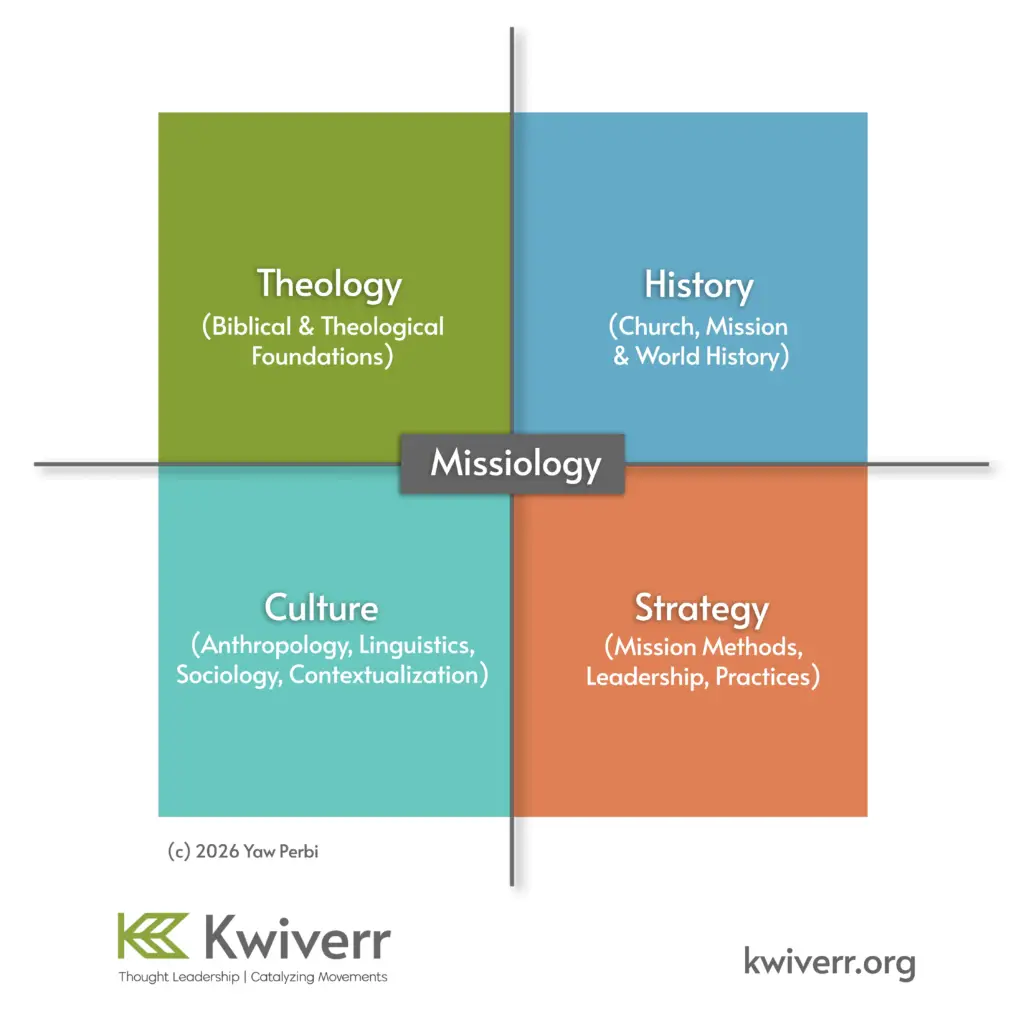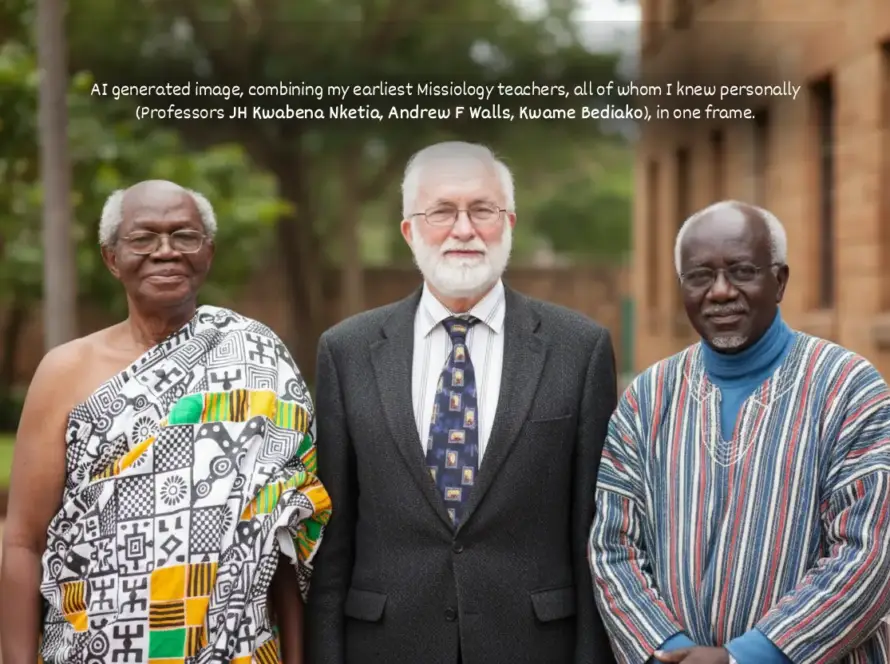(Kwiverr Missiology Series #1)
INTRODUCTION
Missiology. “Missio what?” That has been the most frequent reaction to my mention of the term among friends and family; even in church circles and professional spaces. Knowing very well that I love to play with words, people in my spheres of influence have simply assumed that I made up the word ‘Missiology.’ But no; not this time. Not this word. Missiology is actually a thing. For real.
HISTORY ON REPEAT
History repeats itself, they say. In a sense, I feel like my grandfather (if I should dare), who also pursued, introduced and expanded a missing ‘ology’ in his time: ethnomusicology. In fact, it was considered so ridiculous to be studying African music, instruments, dance and performance at the university level—even in the immediate aftermath of freedom from British colonial rule—that some academic contemporaries and students alike disparagingly nicknamed these African studies and performing arts “Dondology” (dondo is the local name for the hourglass drum).
That was 60 years ago. No, make it 70. Fast forward to today. Missiology is the new missing ‘ology.’ Few from where I hail have heard of it. But maybe you can forgive them when you consider that even before getting into the ‘deeper waters’ of Missiology, many people, especially Christians, who have heard of ‘mission’ and may have even participated in some activity they called “missions”, do not have a comprehensive definition of it. Let’s not even go into the fact that a significant number of Christians, including missionaries themselves, do not know there is a distinction between mission and missions.
MISSION(S) FOR STARTERS
In Africa to the Rest, my Kenyan co-author and I define Mission as “God’s redemptive purpose in the world which all God’s people are to participate in, by their being and doing in the world, to extend the kingdom of God on earth as it is in heaven, all flowing from and in accordance with God’s own nature and will. In Latin, it is often referred to as missio Dei (the mission of God).”
Missions, on the other hand, “refers to the diverse activities and ways, methods, and means of God’s people to carry out mission—evangelism, discipleship, church planting, relief work, etc. Missions is mission practice. The word is written in plural form but often treated as singular hence people who are typically not in the vocational mission(s) space tend to think there is a violation of the subject-verb agreement.”
So, mission is purpose and missions is practice. Interestingly, we also defined ‘missional’, ‘missional church,’ ‘missionary’ and even ‘mobiology’ (the study of mission mobilisation) in the book but somehow did not include ‘Missiology.’ Poor Missiology! So by the time you get to Missiology, you’re on a very lonely path. Almost no one in my circles—and these are minimum first degree holders—had heard the term when I began formal studies in it at Fuller Seminary in 2016. I still meet people today who are pleasantly surprised, and impressed, with the term coming out of my mouth!
Yet Missiology has been around for a long, long time, such that my alma mater and current institution for my doctoral studies is celebrating its 60th anniversary of Missiology in October 2025. In this Kwiverr Missiology Series of articles, I seek to expose what Missiology is and why it can no longer be the missing ‘ology’ in the places where Christianity is booming the most, especially Africa.
AND NOW, WHAT IS MISSIOLOGY?
As you might be aware, ‘logy’ or ‘ology’ is a suffix in the English language used to describe a subject or the study of something. Missiology, therefore, is carved out of mission + logy. According to Oxford Languages, Missiology is “the study of religious (typically Christian) missions and their methods and purposes.”
Missiology is the formal, academic study of Christian mission—its theology, history, cultural engagement and methods/strategies. Again, on a deeply personal level it seems I have discovered my sweet spot as my love for theology and leadership (strategy) have found a meeting point where there is also a confluence of my professor-grandfather’s academic pursuits in culture with my professor-mother’s in history.

At its core, Missiology asks:
- Why do Christians engage in mission? (Theology of mission)
- How has mission been done across the ages? (History of mission)
- How do missions and missionaries engage their contexts? (Anthropology and Sociology of mission)
- How can mission be done faithfully and effectively today? (Practical strategies of mission)
All of this makes Missiology a very interdisciplinary and practical subject. With all that said, one would now recognize that a publication like Africa to the Rest is a book on Missiology. Anyone taking a course like Perspectives on the Worldwide Christian Movement or its Reader’s Digest version called Kairos is invariably studying Missiology.
CONCLUSION
The study of why and how mission is done is Missiology. Inasmuch as Missiology sounds like Missin’ology, it should not—and indeed cannot—be a missing ‘ology’ any longer. Like Dondology today, a hitherto missing ‘ology’ in my grandfather’s era, it is my hope that Missiology will rise fast as a well-known and well-respected post-modern academic discipline in the Global South, especially Africa. And this must bode well for those regions’ missionary enterprise, with Christianity having drastically shifted its so-called ‘centre of gravity’ from the West to the Rest.
Post Script:
The next article in the Kwiverr Missiology Series will seek to prove Missiology as a bonafide academic discipline, providing quite a bit of historical underpinnings and rigorous evidence.
REFERENCE
Perbi, Yaw and Sam Ngugi. Africa to the Rest: From Mission Field to Mission Force (Again). Maitland, Florida: Xulon Press, 2022.



